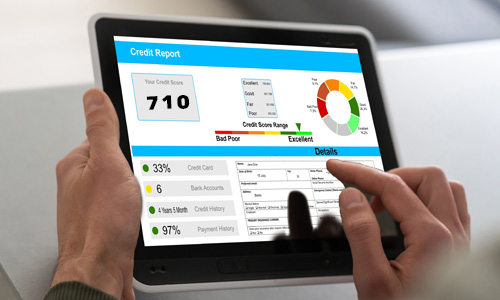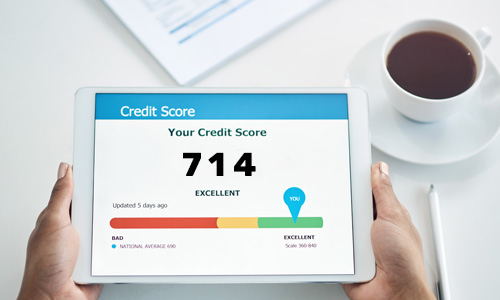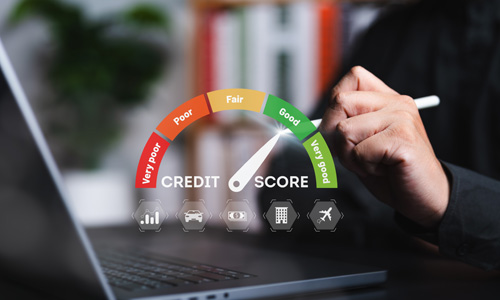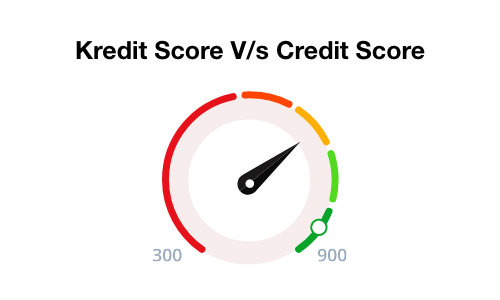- What is a Good Credit Score for Personal Loans?
- What is the minimum credit score required for personal loans in the UAE?
- How can Credit Score Affect Personal Loan Application?
- Other Factors Affecting Personal Loan Applications
- How Can You Improve Your Credit Score in the UAE?
- Where to Get Reliable Information Related to Credit Score?
- Key Takeaways
Credit Score for Personal Loan
Get your credit score in 20 seconds
If you own a credit or financial instrument, the credit score is a term that you may have come across several times. Depending on the credit instrument and the lender, credit score holds varying levels of importance. The same applies to personal loans as well. Whatever be the importance regarded to credit score by a lender, it is always an essential aspect of the decision-making process with personal loan applications.
To understand the importance and practical application of credit score for personal loan approvals, let’s have a look at its fundamentals and some other factors that may make an impact along with it.
What is a Good Credit Score for Personal Loans?
Technically, a credit score of 700 points or above is considered a good credit score UAE by most banks and financial institutions. So if your credit score is below 700, it is suggested to take some measures to improve it. Credit score generally ranges between 300 and 900 points. While scores in the range of 300-570 are considered poor, those between 570-710 are considered fair, with the ones between 711 to 745 considered good.
For categorising as excellent credit scores, the range generally followed is from 746 to 900.You are good to go in terms of credit score per personal loan if it is any number above 710. Notably, people with fair credit scores don’t necessarily get denied personal loans. However, the interest rates can be higher for people who only have a fair credit score instead of an excellent one.
What is the minimum credit score required for personal loans in the UAE?
The minimum credit score to get a personal loan in the UAE is 580. While 580 is termed as a low range credit score as categorized by AECB, banks still accept applications for personal loans from applicants with at least 580 credit scores in the UAE.
How can Credit Score Affect Personal Loan Application?
Credit score in the UAE will play a significant role in deciding whether you get a personal loan in the UAE, and the interest rate applied if you get it. Most applicants with fair or good credit scores usually get a personal loan in the UAE easily. In such cases, the part where your credit score in the UAE makes a difference is the interest rates you get for your loan. The better the credit score you have, the lesser interest rates you can expect with your personal loan.
Unlike credit cards, applicants often get a chance to negotiate the interest rates offered with personal loans. This is why the concept of low-interest rate loans exists. However, this facility of negotiation is mostly open to only applicants with excellent or close to excellent credit scores, i.e., a score that ranges from 710 to 900 or 745 to 900. If you maintain your credit score for personal loan on the greater end of the scale, chances are that you will get the amount you desire from the loan and a low-interest rate.
| 5 Tips to Build a Powerful Credit Score |
Other Factors Affecting Personal Loan Applications
Debt-to-Income Ratio:
The debt-to-income ratio of an applicant determines whether your income at this point will be enough to cover the repayment schedule of the loan. A low debt to income ratio signifies that your income is significantly higher than the amount due for loan repayment. Ratios around 20% are considered good by banks, while the ones above35% are considered high risk. Please note that you may still get the loan even if you have a high debt to income ratio. However, having this ratio on the lower side gives you the chance of obtaining a lower interest rate.
Credit History:
The different financial and credit instruments you have had, and your manner of handling them makes a major difference with personal loan applications. Having a long, well-managed, and diverse credit history shows that you are well-versed in handling borrowed money, which assures the lenders of your creditworthiness.
Free Cash Flow:
The free cash flow is the amount of money you are left with each month after fulfilling the requirement of basic expenses. This can include your groceries, rent, and other such expenses. Your free flow cash of each month can determine the amount of extra money you possess to cover the loan repayment, which is of interest to the banks when offering you the loan.
Employment History:
Banks usually prefer people who have stable jobs and have been employed for a significant amount of time. The motive behind this is the same as free cash flow– banks need to make sure whether the borrower would be able to pay back the loan in time and cover the monthly instalments.
| How Making Minimum Payment Affects Credit Score |
How Can You Improve Your Credit Score in the UAE?
Bill Payment History:
Credit score is all about determining your creditworthiness. This is why making your bill payments on time makes a massive impact when credit score in the UAE is determined. As per reports, your bill payment history contributes up to 35% in making (or breaking) your credit score. Whether it is your bill regarding utilities or electricity, every bill that you pay on time adds to your credit score in the UAE, while every deadline you miss decreases it. It is crucial to note that as this also includes bounced cheques, make sure that you submit only completely legitimate cheques that are sure to get through.
Credit Card Debts:
Taking on a credit card is a swift way to build your credit score in the UAE. At the same time, missing out on repaying your credit card debt can diminish your score equally fast. On top of it, the balance that you utilise from the overall limit allowed on your card also makes a difference. Maxed-out credit cards always lead to a dip in credit score for personal loan. Consequently, the optimal way to use your credit card is to utilise 15%-30% of the total credit limit allowed on it. The credit card debt you have at any given moment, and the percentage of total credit limit utilised, can make up to 30% of your credit score in the UAE.
Credit History:
Your credit history signifies the amount of time for which you have used your credit instruments and financial instruments for. Besides credit cards, this also includes different kinds of loans and bank accounts. From the first bank account you opened to the most recent credit card — everything is taken into consideration here. A longer credit history demonstrates that you are responsible enough to handle a credit instrument for long periods, which increases your creditworthiness. Credit history can influence your credit score up to 15%.
Diversification of Credit Accounts:
If you have different types of bank accounts and credit instruments, and all are managed well enough, your credit score for personal loan can take a significant hike. Having a diverse portfolio in terms of financial instruments can easily work to your advantage. However, it is advised not to take multiple credit instruments at once for the sake of diversification. As one may fail to properly manage such multiple instruments if taken without requisite reasons, this may actually end up having a negative effect instead. A diverse (and well-managed) portfolio can impact your credit score up to 10%.
Credit Enquiries:
Being aware of your credit status is always recommended for the purpose of managing your finances. Making credit enquiries is one of the ways to know where you stand. However, make too many credit enquiries for loans and credit card disbursement, and your credit score can be negatively impacted. To avoid this, check your credit score in the UAE only once a month on average. While this factor might appear minuscule, s you should remember that your credit enquiries can encompass up to 10% of your credit score.
| Credit Score for different types of Loan | |||
|---|---|---|---|
| Credit Score for Personal Loan | Credit Score for House Loan | Credit Score for Car Loan | Credit Score for Student Loan |
Where to Get Reliable Information Related to Credit Score?
al etihad credit bureau, or the AECB, is responsible for giving out all the necessary information related to your credit score. A small fee is chargeable every time you apply to get your AECB credit score. For individuals, the fee to obtain a credit score along with a credit report is AED 84 + VAT.
However, if you want to check your AECB credit score for free, you can easily do so when you apply for personal loans or credit cards with Policybazaar UAE. This feature will generate the reports from the AECB itself. However, it will be free for you as a customer, as Policybazaar UAE will bear the cost of the AECB credit score in this case.
Key Takeaways
As evident, banks always consider credit scores for personal loan approvals and determining the interest rates you get. So, while you may still get a personal loan with a not-so-good credit score, it won’t be a good deal as the interest rates might be high. A low credit score signifies low creditworthiness, hence a higher risk for the lender. Consequently, you should occasionally check your credit score in the UAE, and use an AECB credit score to ensure maximum reliability. Keep your financial instruments in check at all times, and never miss the due date of repayment or bill payment date.
As per AECB categorization, a credit score above 700 is considered good for getting a personal loan approved. Anything above 700 is termed as high credit score with 3 or 4-star rating. This is a direct reflection of an applicant’s creditworthiness.
Improving your credit score in the UAE is a continuous process and you need to be mindful of your payment patterns. However, you can shoot your score up a few points by making a few simple changes to your payment routine like – paying your bills on time, tracking repayment dates and being punctual with them.
Yes, employment history is one of the many things that can affect your personal loan application in the UAE. Having a stable job with a good salary is an important factor that banks consider while evaluating your creditworthiness for personal loan applications.
You can get your credit score in the UAE by visiting the AECB’s website or through their mobile application. A small fee is applicable for getting credit scores from AECB. Alternatively, you can get your credit scores for free from Policybazaar.ae when you apply for a personal loan or a credit card.
AECB (Al Etihad Credit Bureau) is an institution responsible for confidential credit reporting of the applicants. It is basically responsible for calculating credit scores in the UAE.

More From Credit Score
- Recent Articles
- Popular Articles












